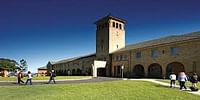- The course provides broad coverage across a range of core electrical and electronic subjects, leading to more in-depth studies of power systems including generation, transmission and protection, as well as power electronics, electromechanical systems, industrial control, and renewable energy.
- As with all of the Schools engineering programs, the Electrical Power Engineering program focuses on the development of knowledge and skills relevant to professional engineering practice and along with a sound theoretical base, includes strong elements of practical problem solving, team work and project development.
- As a result, as well as having multiple technical and transferable skill competencies, graduates will gain strong analytical skills, and have the ability to lead complex projects.
- The course provides a sound basis in mechanics, dynamics, mathematics, and the principles of engineering design in the first two years of study, along with a broad basis in engineering science including materials and manufacturing, computer aided design, programming principles, and analogue and digital electronics.
Bachelor of Engineering [B.Eng] (Electrical Power Engineering)
4 years
Honours & On Campus
English
Field of Study:
A$36,825/Yr
A$36,825 /Yr
Important Dates
| Event | End Date |
| Application Deadline for 2024 Intake Semester 1 | Dec 9, 2023 |
| Document Submission Deadline | Dec 23, 2023 |
Fees & Funding
Tution & Application Fees
| Year | Year 1 | Year 2 | Year 3 | Year 4 |
| Tuition Fees | A$36825 | A$36825 | A$36825 | A$36825 |
| Total Fees | A$36825 | A$36825 | A$36825 | A$36825 |
Eligibility & Entry Requirement
Academic admission requirements may be satisfied through completion of one of the following:
- AQF Cert IV;
- Successfully completed 0.25 EFTSL of study at bachelor level or higher at an Australian higher education provider (or equivalent);
- Special Tertiary Admissions Test;
- University Preparation Course;
- Indigenous University Orientation Course;
- Aboriginal Student Intake Test;
- Experience Based Entry Scheme.
- Higher Secondary Certificate or Equivalent (Standard Entry) – 65%.
Ask your question
Similar Colleges You Might Be Interested In
- Similar Colleges
No Ratings Found!!
Follow
No Ratings Found!!
Follow



